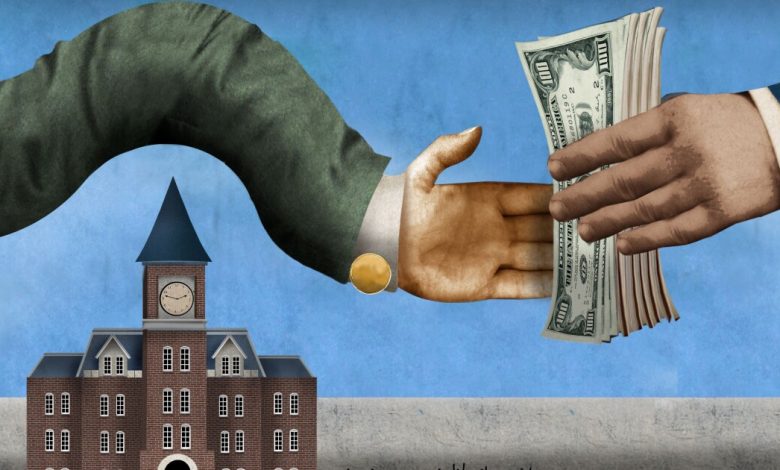An Overseas Ed-Tech Firm Wants to Buy 2U. What Could That Mean for Colleges?

[ad_1]
What happens to a college’s online programs if the company operating them changes hands? It’s a question on the minds of higher-ed leaders as an overseas ed-tech company attempts to buy 2U.
Byju’s, an ed-tech behemoth based in India, has put more than $1 billion on the table to acquire the online program manager, Bloomberg first reported late last month. 2U is one of the largest online-program managers, or OPMs, in the United States, known for scaling up online-degree programs and teaming up with more than 130 American colleges, including large institutions such as Arizona State, New York, and Syracuse Universities. It’s also the parent company of the online-course provider edX.
This particular scenario — where an international vendor is seeking to purchase an American company it’s not in direct competition with — is highly unusual in the sector, ed-tech experts told The Chronicle. And it’s already raising questions among colleges of what it could mean for the scope and quality of 2U’s services.
When it comes to online-degree programs, 2U is involved in the entire life cycle, running marketing and faculty trainings, operating the online-learning platform, lending 24/7 IT support, and hosting placement programs for post-graduation jobs and internships. It’s also known to prioritize small class sizes, with an average of 16 students in a class for its degree programs.
The worry among colleges, these experts say, is that if Byju’s wanted to shave costs or focus more on short-term, course-level products, it could scale back that “high-touch” model that many institutions have come to expect in exchange for paying 2U millions of dollars through tuition-sharing agreements. There’s wariness, too, of temporary disruptions that can happen whenever a company undergoes reorganization.
College leaders fear that Byju’s intent is to “use the toehold and cash flow to accomplish some other goal,” and that 2U’s clients will not be a priority, said Clay Shirky, vice provost for educational technologies at New York University, which works with 2U. “That’s what we’re worried about.”
A Changing Market
While the bidder is surprising, industry experts noted that the poaching of 2U is not, given the publicly traded company’s plummeting market value. They see this offer, in fact, as indicative of the shifting nature of the ed-tech market.
“We have a situation in which both publicly traded companies and start-ups are cheaper than they normally would be,” wrote Michael Feldstein, a longtime ed-tech consultant and blogger, in an email. “Ed-tech companies or private-equity firms that have a lot of cash on hand are bargain hunting.”
With that instability comes a higher likelihood that colleges could see the ed-tech companies they work with change hands throughout the duration of a contract — which, at least for some of 2U’s institutions, can be 15 or more years.
“Your favorite EdTech vendor is much more likely to acquire (or be acquired) in the next few years than they had been” in years past, another longtime industry watcher, Phil Hill, wrote in a recent blog post on this development.
To be sure, there is no deal yet. There have been skeletons “tumbling out of Byju’s closet” recently, inviting scrutiny of its fiscal health, the Indian media outlet Morning Context reported this month. Of the $800 million Byju’s said it had raised this year, $400 million came from its own chief executive’s investments. An additional $250 million of it has yet to materialize, according to Morning Context. Last month the company also requested an extension on making payments toward a previous acquisition.
2U is still in a vulnerable position, though. The publicly traded company’s stock price as of mid-July had dropped more than 80 percent since early 2021. Its recent market value was $717 million, a fraction of its peak of $5.15 billion in June 2018.
The OPM’s chief executive, Chip Paucek, has been “reassuring to us about 2U’s commitment” to working closely and collaboratively with its partner institutions, Shirky said. But Paucek also acknowledged that public companies are always for sale, Shirky added. “Chip has an obligation as a CEO to consider the offer and take it to his board.”
A 2U spokeswoman declined to respond to questions about a potential acquisition by Byju’s, noting that company policy is “to not comment on market speculation.”
A Question of Commitment
An international company seeking to break into the United States’ education market isn’t unheard of. About 30 American colleges, for example, have active contracts with India-based companies alone, according to a Chronicle analysis of a U.S. Department of Education database.
Still, experts wonder: Why 2U?
Byju’s has more than 100 million users on its learning app, but its services are geared toward elementary- and secondary-school students, and focus more on short-term learning programs and test prep than the degree programs that are 2U’s bread and butter. Just weeks before its offer to 2U made the news, Byju’s was reportedly eyeing Chegg, an American company known for digital and physical textbook rentals, among other student services.
There’s certainly a financial incentive. The Economic Times in India reported that Byju’s intends to become a publicly traded company in the next year, and may want to beef up its portfolio to attract investors in the United States.
But Byju’s existing focus on direct-to-consumer, course-level content makes experts like Hill wonder if the primary interest is not so much in 2U but in edX, which offers university-level courses across a range of disciplines and holds the access key to a reported 42 million users. And if that’s indeed the case: Does 2U get stripped for parts, or scaled down?
“EdX makes more sense to me” as the main draw, given its business-model similarities to Byju’s and the fact that it’s less regulated, Hill said. “I would have a question about [Byju’s] commitment” to 2U’s current offerings, “especially on the degree-based side.”

Further Reading
Byju’s did not return requests for comment on how it envisions operating 2U and edX in the event an acquisition goes through.
Shirky, of NYU, added that — generally — acquisitions can just be a headache for clients (in this case, colleges). If the new owner goes on a hiring spree, there are onboarding and HR distractions. If there are cuts in the staff, especially in places like call centers, it may take longer to get assistance. Existing employees may be reassigned to new roles to better align with the new owner’s agenda, compromising the original business model.
“Almost no one who acquires a firm acquires it because they think, ‘Man, that CEO has really got the right strategy,’” Shirky said. And even if the strategy doesn’t change, if quality suffers during the transition, “It’s our [the college’s] reputation on the line with programs we offer.”
With so much still unknown, experts and faculty members were reluctant to speculate on whether an acquisition would push some colleges away from 2U and edX altogether. Faculty members at several colleges that work with 2U or edX declined or did not respond to requests for comment from The Chronicle.
How easy it would be for disenchanted colleges to modify or terminate their agreements with a company like 2U is very case-dependent, said Jeff Knight, an education lawyer. Many of them are in contracts with the OPM that run more than a decade. Simmons University, in Boston, is locked in until 2039; the University of California at Berkeley is about halfway through a 15-year contract with 2U, set to expire in mid-2029.
UC-Berkeley’s contract, previously obtained by the Century Foundation, seems to allow the institution to end the arrangement if Byju’s were to scale back 2U services in tangible ways that depart from what the college signed on to, Knight said. It includes provisions that allow for termination in the case of “a material reduction in the financial or other resources devoted by 2U (or its successor) to 2U’s services,” or a reduction “in operating plans previously agreed upon.”
Contracts are “an art, not a science,” he said. And “language becomes more important the longer the term or the relationship is designed to last.”
[ad_2]
Source link





